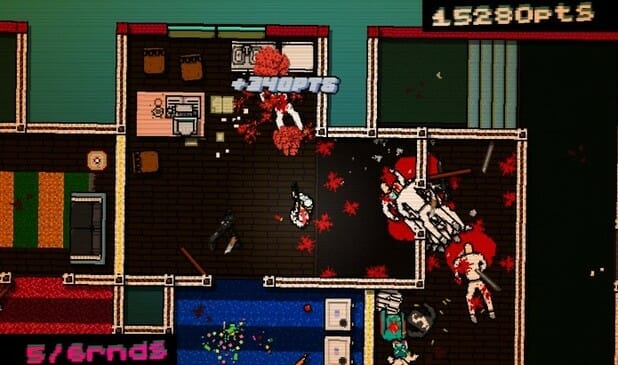Hotline Miami (PC)

The driving synths have stopped and everybody in the building is dead. The level is over. I can exhale. The adrenaline drops and so does the sound. It’s not quite silence, but the dead hum of a television with nothing on. I retrace my steps to the start, bodies and carnage everywhere. In the neon decor, all unnatural pastels and gaudy patterns rendered in cold pixels, the bright colour of the blood pops. I’m spent, and only now do I realize how hard I’ve been clutching the mouse. Every high fades.
There is no time to consider this when you play. In the thick of it, Hotline Miami makes me feel two contradictory things: a foolish godlike invincibility, and a deep fear. In the game I see everything from a bird’s eye view. I see where all the enemies are, what they’re carrying, how they move. Before I execute a ballet of violence, I have the upper hand. I am cold and unfeeling.
Push through a door, knock one guy down, take his shotgun and spray his friend with bullets. Get on my knees and punch the unconscious man into a bloodied pulp. The music is an engine, pure cold sex, feeding into it. It’s perfect—and that’s what it takes, perfection. I die countless times because this is an unforgiving game, but that difficulty makes victory euphoric and vicious. I ride that until I realize that there are now 3 guys rushing towards the room, having heard the sound of violence, and I only have one cartridge in the chamber. I cower behind the door, because one hit will kill me. And I wait, afraid. There is no space for remorse here, not until it’s all over.
Who are you killing? Why? These answers aren’t known to the protagonist. They aren’t known to you. In Hotline Miami every “mission” begins in a squalid apartment with an answering machine message alluding to a target. He gets into his gull-wing car, puts on a rubber animal mask, and drives off to kill everybody he can. The developers, Denis Wedin and Jonatan Söderström, aren’t just offering hyperviolent escapism. Söderström’s (who some of you may know as the prolific indie developer “cactus”) work sounds weird at first listen, but grows haunting when played. Hot Throttle is a racing game about men who want to become cars. They crawl, naked, on all fours and win races to upgrade their bodies with car parts. Norrland seems to be a cruel day-in-the-life collection of joke minigames at the expense of a rural Swede, but ends on an uncomfortable act of humanizing self-hate. Hotline Miami’s unsettling undercurrent is that it keeps indirectly asking, “Why are you doing this?”

There’s something both seductive and sickening about the game. Denis’ artwork doesn’t convey the reality of 80s Miami, but, instead, what we think of when we hear “80s Miami.” It’s a land of fast cars and good cocaine, a neon Gomorrah. Vice City, the best entry in the Grand Theft Auto series, exploited the same stylized hyper-reality and, crucially, the same level of violence as just another excess. It’s a parody, but it doesn’t use the style as anything except shorthand for the all-flash-no-substance of the culture. Vice City makes it all so sexy, and so does Hotline Miami, until it doesn’t.
A better reference point is the Bret Easton Ellis slaughterhouse American Psycho. Instead of a yuppie psychopath stuck in a cycle of numbing materialism, Hotline Miami taps into Millennial alienation and desensitization. In between the crime scenes, Hotline Miami shows a barren life of solo nights at bars and getting the latest VHS tapes at the local video store. Patrick Bateman and the nameless (hero? villain? anti hero?) of Hotline Miami disintegrate as they go along, becoming more rudderless and unhinged as things grow worse and more brutal.
-

-

-

-

-

-

-

-

-

-

-

-

-

-

-

-

-

-

-

-

-

-

-

-

-

-

-

-

-

-

-

-

-

-

-

-

-

-

-

-








































